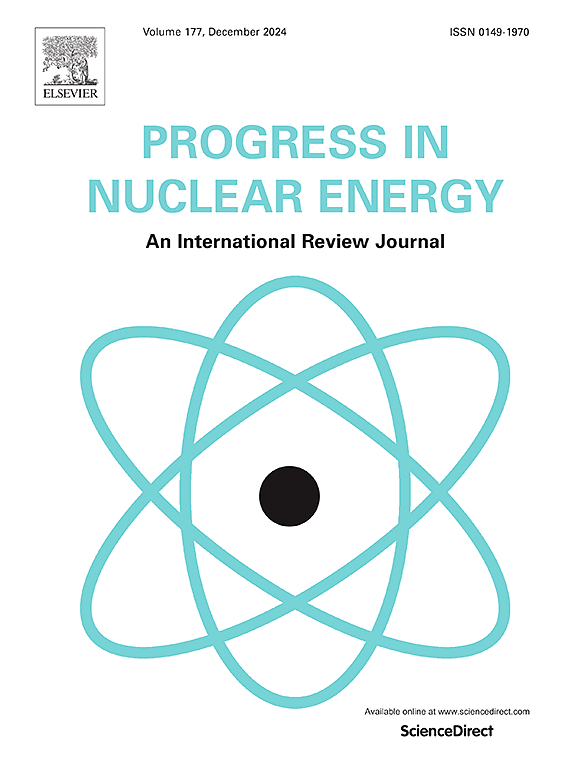Optimization and simulation of startup control for space nuclear power systems with closed brayton cycle based on NuHeXSys
IF 3.3
3区 工程技术
Q1 NUCLEAR SCIENCE & TECHNOLOGY
引用次数: 0
Abstract
This study presents the optimization of startup control strategies for space nuclear power systems utilizing a Closed Brayton Cycle (CBC) with helium-xenon as the working fluid, addressing the critical challenge of battery limitations in space missions. A novel simulation tool, NuHeXSys, was developed to model the system, incorporating non-ideal gas behavior, multi-channel reactor core dynamics, and turbomachinery performance. Leveraging this model, the Non-dominated Sorting Genetic Algorithm II (NSGA-II) was employed to optimize key control parameters, including reactivity insertion, turbine shaft speed, and cooler temperature. The optimization results demonstrate a significant reduction in startup time by 1260 s, with the turbine inlet temperature reaching its nominal value 1980 s earlier. Additionally, external energy requirements decreased by 17.2%, and peak power demand was reduced by 27.9%, thereby improving overall system efficiency and reducing reliance on onboard batteries. The integration of NuHeXSys with NSGA-II offers a comprehensive framework for enhancing startup performance, providing crucial improvements for long-duration space exploration missions.
求助全文
约1分钟内获得全文
求助全文
来源期刊

Progress in Nuclear Energy
工程技术-核科学技术
CiteScore
5.30
自引率
14.80%
发文量
331
审稿时长
3.5 months
期刊介绍:
Progress in Nuclear Energy is an international review journal covering all aspects of nuclear science and engineering. In keeping with the maturity of nuclear power, articles on safety, siting and environmental problems are encouraged, as are those associated with economics and fuel management. However, basic physics and engineering will remain an important aspect of the editorial policy. Articles published are either of a review nature or present new material in more depth. They are aimed at researchers and technically-oriented managers working in the nuclear energy field.
Please note the following:
1) PNE seeks high quality research papers which are medium to long in length. Short research papers should be submitted to the journal Annals in Nuclear Energy.
2) PNE reserves the right to reject papers which are based solely on routine application of computer codes used to produce reactor designs or explain existing reactor phenomena. Such papers, although worthy, are best left as laboratory reports whereas Progress in Nuclear Energy seeks papers of originality, which are archival in nature, in the fields of mathematical and experimental nuclear technology, including fission, fusion (blanket physics, radiation damage), safety, materials aspects, economics, etc.
3) Review papers, which may occasionally be invited, are particularly sought by the journal in these fields.
 求助内容:
求助内容: 应助结果提醒方式:
应助结果提醒方式:


